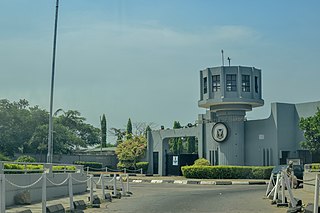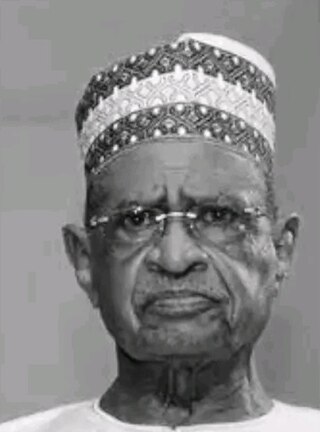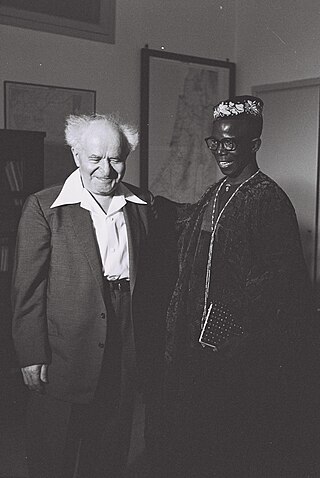Related Research Articles

Shehu Usman Aliyu Shagari was a Nigerian politician who was the first democratically elected president of Nigeria, after the transfer of power by military head of state General Olusegun Obasanjo in 1979 giving rise to the Second Nigerian Republic.

The University of Nigeria, commonly referred to as UNN, is a federal university located in Nsukka, Enugu State, Eastern part of Nigeria. Founded in 1955 by Nnamdi Azikiwe who was the Governor General of Nigeria between 1960 and 1963, and first President of Nigeria between 1963 and 1966. The University of Nigeria Nsukka was formally opened on 7 October 1960. The University of Nigeria has three campuses in Enugu State–Nsukka, Enugu, and Ituku-Ozalla – and the Aba campus in Abia State.
Queen's College, Lagos, is a government-owned girls' secondary (high) school with boarding facilities, situated in Yaba, Lagos, Nigeria. Often referred to as the "sister college" of King's College, Lagos, it was founded on October 10, 1927, when Nigeria was still a British colony.

The University of Ibadan (UI) is a public research university in Ibadan, Nigeria. The university was once a college of the University of London. The college was established in 1948 as University College Ibadan, one of many colleges within the University of London. It became an independent university in 1962 and is the oldest degree-awarding institution in Nigeria. Through its graduate network, the University of Ibadan has contributed to the political, industrial, economic and cultural development of Nigeria.

Obafemi Awolowo University (OAU) is a federal university in Ile-Ife, Osun State, Nigeria. The university was founded in 1961 and classes commenced in October 1962 as the University of Ife by the regional government of Western Nigeria, which was led by Samuel Ladoke Akintola. It was renamed "Obafemi Awolowo University" on 12 May 1987, so by the Ibrahim Badamasi Babangida led military administration, in honour of Obafemi Awolowo (1909–1987), the first premier of the Western Region of Nigeria, who initially thought of the idea of establishing the university.

Eni Njoku was a Nigerian botanist and educator. He was vice-chancellor of the University of Lagos (1962–1965) and the University of Nigeria, Nsukka (1966–1970). He served in the Nigerian House of Representatives as federal minister of Mines and Power, and was chairman of the Electricity Corporation of Nigeria. He was an emissary at OAU-sponsored peace talks.
Ishaya Sha'aibu Audu ; 1 March 1927 – 29 August 2005) was a Nigerian doctor, professor, and politician. A Kattafawa, Christian, he served as minister of external affairs from 1979 to 1983 under Shehu Shagari.

Iya Abubakar is a Nigerian politician and mathematician who held multiple cabinet level appointments during the Nigerian Second Republic, and Senator for Adamawa North from May 1999 to May 2007.

Gabriel Akinola Deko was a Nigerian building contractor and former regional Minister for Agriculture in the Western region of Nigeria, he was also a personal friend of Awolowo. As minister, he was involved in the promotion of an agriculture settlement scheme that would employ and pay an initial amount of capital to new graduates from an established agriculture training college. The graduates would engage in farming. This settlement scheme was borrowed from an Israeli agriculture development scheme, Moshav. The scheme was partly initiated to arrest a tide in the movement of young men and women to the urban areas where farming is hardly a career choice.

Government College Umuahia, or GCU, is an independent secondary school for boys located on Umuahia-Ikot Ekpene road in Umuahia, Nigeria.
Chief Sunday Afolabi is a Nigerian politician who served in the Cabinet of President Olusegun Obasanjo as Minister of Internal Affairs.
Justice Victor Ovie Whisky was chairman of the Federal Electoral Commission (FEDECO) appointed by President Shehu Shagari during the Nigerian Second Republic. He held office from 1980 to 1983.
Sir Kofoworola Adekunle "Kofo" Abayomi, KBE was a Nigerian ophthalmologist and politician. He was one of the founders of the nationalist Nigerian Youth Movement in 1934 and went on to have a distinguished public service career. His last major public assignment was as chairman of the Lagos Executive Development Board from 1958 until 1966.
Chief Akintola Williams was a Nigerian accountant. He was the first Nigerian to qualify as a chartered accountant.

Chukwuedu Nathaniel II Nwokolo was a Nigerian physician specialist in tropical diseases. He was recognised for discovering and mapping out the area of paragonimiasis lung disease in Eastern Nigeria, with a study of the disease in Africa and clinical research for its control. He founded SICREP: Sickle Cell Research Programme to effectively fight the disease in Nigeria and globally.

Ibrahim Bata Malgwi Haruna is a retired officer of the Nigerian Army. He was a Federal Commissioner for Information and Culture between 1975 and 1977. He was also the Chairman, Executive Council, of Arewa Consultative Forum from 2009 to 2012. He holds the traditional title of Walin Garkida. He has notably been accused for ordering the Asaba Massacre, an atrocity committed during the Nigerian Civil War, but this is actually untrue; the massacre was ordered by Ibrahim Taiwo, as Haruna was not in command at that area. See Elizabeth Bird and Fraser Ottanell's "The Asaba Massacre: Trauma, memory, and the Nigerian civil war", pp. 77.

Usman Sarki dan Malam Saidu MP, CFR was the Federal Minister of Interior from 1959 to 1962 succeeded J. M. Johnson and served as the 10th Etsu Nupe from 1962 to 1969 succeeding the 9th Etsu Nupe Muhammadu Ndayako. He was succeeded by his cousin, the 11th Etsu Nupe Musa Bello.
Shehu Ahmadu Musa, GCON, CFR was a public administrator and chieftains holder of Makaman Nupe. He was the Secretary to the Government of the Federation of Nigeria during the Nigerian Second Republic between 1979 and 1983.
Ahmadu Bello UniversityZaria is a federal government research university located in Zaria, Kaduna State, Nigeria, opened in 1962 as the University of Northern Nigeria. It was founded by and is now named for Ahmadu Bello, the first premier of Northern Nigeria.
References
- ↑ Nwauwa 1997, pp. 58.
- ↑ Nwakanma 2010, pp. 48.
- 1 2 Nwauwa 1997, pp. 60.
- ↑ Nkulu 2005, pp. 52.
- ↑ Nkulu 2005, pp. 53.
- ↑ Nwakanma 2010, pp. 61.
- ↑ Nwauwa 1997, pp. 62.
- ↑ Hubbard 2000, pp. 97.
- ↑ Hubbard 2000, pp. 98.
- ↑ Ekundare 1973, pp. 359.
- ↑ Nkulu 2005, pp. 54.
- ↑ Obiakor & Gordon 2003, pp. 129.
Sources
- Ekundare, R.O. (1973). An Economic History of Nigeria 1860-1960. Holmes & Meier. ISBN 084190135X.
- Hubbard, James Patrick (2000). Education under colonial rule: a history of Katsina College, 1921-1942. University Press of America. ISBN 0-7618-1589-9.
- Nkulu, Kiluba L. (2005). Serving the common good: a postcolonial African perspective on higher education. Peter Lang. ISBN 0-8204-7626-9.
- Nwakanma, Obi (2010). Christopher Okigbo 1930-67: Thirsting for Sunlight. Boydell & Brewer Ltd. ISBN 978-1-84701-013-1.
- Nwauwa, Apollos Okwuchi (1997). Imperialism, academe, and nationalism: Britain and university education for Africans, 1860-1960. Routledge. ISBN 0-7146-4668-7.
- Obiakor, Festus E.; Gordon, Jacob U. (2003). African perspectives in American higher education: invisible voices. Nova Publishers. ISBN 1-59033-683-6.